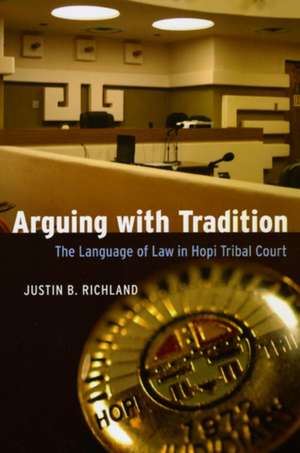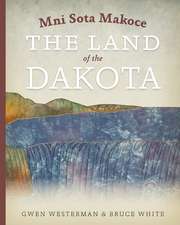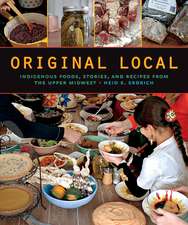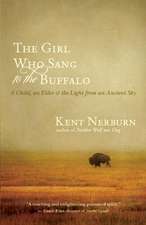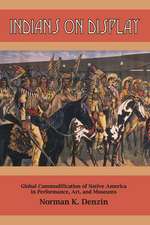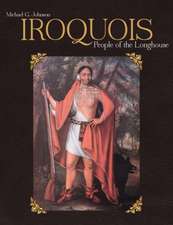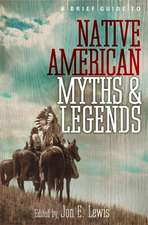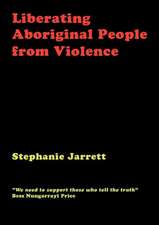Arguing with Tradition: The Language of Law in Hopi Tribal Court: Chicago Series in Law and Society
Autor Justin B. Richlanden Limba Engleză Paperback – 14 aug 2008
Arguing with Tradition is the first book to explore language and interaction within a contemporary Native American legal system. Grounded in Justin Richland’s extensive field research on the Hopi Indian Nation of northeastern Arizona—on whose appellate court he now serves as Justice Pro Tempore—this innovative work explains how Hopi notions of tradition and culture shape and are shaped by the processes of Hopi jurisprudence.
Like many indigenous legal institutions across North America, the Hopi Tribal Court was created in the image of Anglo-American-style law. But Richland shows that in recent years, Hopi jurists and litigants have called for their courts to develop a jurisprudence that better reflects Hopi culture and traditions. Providing unprecedented insights into the Hopi and English courtroom interactions through which this conflict plays out, Richland argues that tensions between the language of Anglo-style law and Hopi tradition both drive Hopi jurisprudence and make it unique. Ultimately, Richland’s analyses of the language of Hopi law offer a fresh approach to the cultural politics that influence indigenous legal and governmental practices worldwide.
Like many indigenous legal institutions across North America, the Hopi Tribal Court was created in the image of Anglo-American-style law. But Richland shows that in recent years, Hopi jurists and litigants have called for their courts to develop a jurisprudence that better reflects Hopi culture and traditions. Providing unprecedented insights into the Hopi and English courtroom interactions through which this conflict plays out, Richland argues that tensions between the language of Anglo-style law and Hopi tradition both drive Hopi jurisprudence and make it unique. Ultimately, Richland’s analyses of the language of Hopi law offer a fresh approach to the cultural politics that influence indigenous legal and governmental practices worldwide.
Din seria Chicago Series in Law and Society
-
 Preț: 115.92 lei
Preț: 115.92 lei -
 Preț: 216.43 lei
Preț: 216.43 lei -
 Preț: 200.82 lei
Preț: 200.82 lei -
 Preț: 201.21 lei
Preț: 201.21 lei -
 Preț: 217.58 lei
Preț: 217.58 lei -
 Preț: 184.71 lei
Preț: 184.71 lei -
 Preț: 120.37 lei
Preț: 120.37 lei -
 Preț: 225.53 lei
Preț: 225.53 lei -
 Preț: 262.11 lei
Preț: 262.11 lei -
 Preț: 290.55 lei
Preț: 290.55 lei -
 Preț: 388.96 lei
Preț: 388.96 lei -
 Preț: 240.69 lei
Preț: 240.69 lei -
 Preț: 265.76 lei
Preț: 265.76 lei -
 Preț: 293.60 lei
Preț: 293.60 lei -
 Preț: 264.38 lei
Preț: 264.38 lei -
 Preț: 261.59 lei
Preț: 261.59 lei -
 Preț: 258.74 lei
Preț: 258.74 lei -
 Preț: 236.78 lei
Preț: 236.78 lei -
 Preț: 244.16 lei
Preț: 244.16 lei -
 Preț: 235.79 lei
Preț: 235.79 lei -
 Preț: 235.79 lei
Preț: 235.79 lei -
 Preț: 290.34 lei
Preț: 290.34 lei - 23%
 Preț: 574.44 lei
Preț: 574.44 lei -
 Preț: 294.37 lei
Preț: 294.37 lei -
 Preț: 321.66 lei
Preț: 321.66 lei -
 Preț: 276.31 lei
Preț: 276.31 lei -
 Preț: 267.82 lei
Preț: 267.82 lei -
 Preț: 266.29 lei
Preț: 266.29 lei -
 Preț: 259.89 lei
Preț: 259.89 lei -
 Preț: 285.62 lei
Preț: 285.62 lei -
 Preț: 262.55 lei
Preț: 262.55 lei -
 Preț: 320.80 lei
Preț: 320.80 lei -
 Preț: 365.84 lei
Preț: 365.84 lei - 13%
 Preț: 206.04 lei
Preț: 206.04 lei - 21%
 Preț: 549.91 lei
Preț: 549.91 lei
Preț: 218.36 lei
Nou
Puncte Express: 328
Preț estimativ în valută:
41.80€ • 45.42$ • 35.13£
41.80€ • 45.42$ • 35.13£
Carte tipărită la comandă
Livrare economică 21 aprilie-05 mai
Preluare comenzi: 021 569.72.76
Specificații
ISBN-13: 9780226712956
ISBN-10: 0226712958
Pagini: 176
Ilustrații: 2 halftones, 2 maps, 6 line drawings
Dimensiuni: 152 x 229 x 13 mm
Greutate: 0.28 kg
Editura: University of Chicago Press
Colecția University of Chicago Press
Seria Chicago Series in Law and Society
ISBN-10: 0226712958
Pagini: 176
Ilustrații: 2 halftones, 2 maps, 6 line drawings
Dimensiuni: 152 x 229 x 13 mm
Greutate: 0.28 kg
Editura: University of Chicago Press
Colecția University of Chicago Press
Seria Chicago Series in Law and Society
Notă biografică
Justin B. Richland is associate professor of anthropology and the social sciences in the College at the University of Chicago.
Cuprins
List of Illustrations
Acknowledgments
1 Introduction: Arguing with Tradition in Native America
The Ironies of Indigeneity
Native American Tribal Law and Tradition
“Anglo” Law in Indian Country: Courts of Indian Offenses
Tribal Courts Today: At the Edge of Tribal Sovereignty
The Dearth of Ethnographies of Tribal Courts
The Approach and Aims of This Study
An Outline of This Study
2 Making a Hopi Nation: “Anglo” Law Comes to Hopi Country
Hopi Tribal Governance
Hopi Village Organization and Governance
Court Comes to Hopi Country
The Hopi Tribal Court Today
Data and Methodologies: Talking Tradition in Hopi Property Disputes
3 “What are you going to do with the village’s knowledge?” Language Ideologies and Legal Power in Hopi Tribal Court
Legal Discourse Analysis and Legal Power
Language Ideologies, Metadiscourse, and Metapragmatics
Talking Tradition, Talking Law in Hopi Courtroom Interactions
The Language Ideologies of Anglo-American Law versus Hopi Traditional Authority
Conclusion
4 “He could not speak Hopi. . . . That puzzle— puzzled me”: The Pragmatic Paradoxes of Hopi Tradition in Court
Paradox in the Pragmatics of Language and Law
Discourses of Cultural Difference in Hopi Court
Iterations of Indigeneity in a Hopi Court Hearing
Conclusion
5 Suffering into Truth: Hopi Law as Narrative Interaction
Legal Narrativity in and out of Court
A Model of Hopi Law as Narrative Interaction
The Significance of Settings: Judicial Openings of Hopi Courtroom Narrative
The Contested Narrativity of a Hopi Property Proceeding
Conclusion
6 Conclusion: Arguments with Tradition
Tradition, Culture, and the Politics of Authenticity
Arguing with Tradition
Notes
References
Index
Acknowledgments
1 Introduction: Arguing with Tradition in Native America
The Ironies of Indigeneity
Native American Tribal Law and Tradition
“Anglo” Law in Indian Country: Courts of Indian Offenses
Tribal Courts Today: At the Edge of Tribal Sovereignty
The Dearth of Ethnographies of Tribal Courts
The Approach and Aims of This Study
An Outline of This Study
2 Making a Hopi Nation: “Anglo” Law Comes to Hopi Country
Hopi Tribal Governance
Hopi Village Organization and Governance
Court Comes to Hopi Country
The Hopi Tribal Court Today
Data and Methodologies: Talking Tradition in Hopi Property Disputes
3 “What are you going to do with the village’s knowledge?” Language Ideologies and Legal Power in Hopi Tribal Court
Legal Discourse Analysis and Legal Power
Language Ideologies, Metadiscourse, and Metapragmatics
Talking Tradition, Talking Law in Hopi Courtroom Interactions
The Language Ideologies of Anglo-American Law versus Hopi Traditional Authority
Conclusion
4 “He could not speak Hopi. . . . That puzzle— puzzled me”: The Pragmatic Paradoxes of Hopi Tradition in Court
Paradox in the Pragmatics of Language and Law
Discourses of Cultural Difference in Hopi Court
Iterations of Indigeneity in a Hopi Court Hearing
Conclusion
5 Suffering into Truth: Hopi Law as Narrative Interaction
Legal Narrativity in and out of Court
A Model of Hopi Law as Narrative Interaction
The Significance of Settings: Judicial Openings of Hopi Courtroom Narrative
The Contested Narrativity of a Hopi Property Proceeding
Conclusion
6 Conclusion: Arguments with Tradition
Tradition, Culture, and the Politics of Authenticity
Arguing with Tradition
Notes
References
Index
